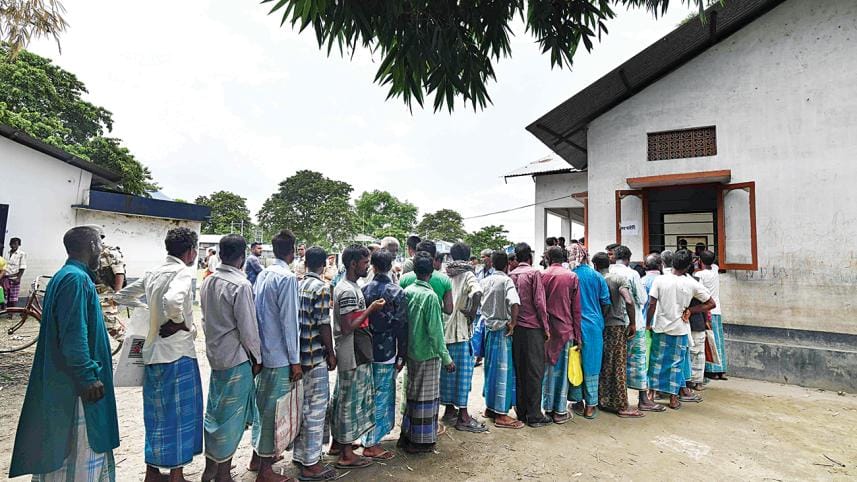India leaves 1.9m off citizens’ list

More than 19 lakh out of about 3.3 crore applicants have been left off the final National Register of Citizens (NRC), published yesterday.
At the stroke of 10:00am Indian time, the NRC authority headed by the apex court-appointed State Coordinator Prateek Hajela released the final NRC on its official website and through its social media handles.
The event was more low-key than the release of the draft NRC on July 30, 2018, by Registrar General of India Shailesh and Joint Director (Northeast) in the Ministry of Home Affairs Satyendra Garg.
A total of 3,30,27,661 people had applied for inclusion in the NRC. Of them, 3,11,21,004 have been included leaving 19,06,657 excluded, a statement from the NRC State Coordinator’s office said.

With this, a mammoth exercise monitored by the Supreme Court ends, taking a long five years and Rs 1,220 crore.
According to rights groups, the exercise also made people in Assam -- mostly Hindus and Muslims under suspicion of being illegal immigrants -- spend more than Rs 7,800 crore on hearings, besides claiming the lives of around 60 people.
Four of them were killed in police firing during a pilot project in western Assam’s Barpeta in July 2010, a few died in accidents during trips to the NRC service centres for hearings, while the rest allegedly died of shock and anxiety because of the fear of becoming stateless.
State Home Department officials said though the NRC was called “final”, the people excluded would have opportunities to be back on the citizens’ list if they appeal against their exclusion and establish their citizenship via courts.
The Assam government has already ruled out detention of people who do not figure in the list “in any circumstances” till the time Foreigners Tribunals declare them foreigners.
Each excluded person will have 120 days to file an appeal at any of the existing 100 Foreigners’ Tribunals -- 200 more are to be established within a month -- which in turn will have to dispose of the cases within six months. The appellant then has the option of approaching the High Court and the Supreme Court.
Indian government sources said no one would be sent to detention centres until all legal options are exhausted.
Assam’s ruling Bharatiya Janata Party, main opposition Congress and All Assam Students Union, which had waged a six-year-long violent agitation against foreigners in Assam between 1979 and 1985 before the Assam Accord was signed envisaging the NRC, expressed unhappiness with the final NRC.
The AASU said it would move the Supreme Court against “all the faults” in the final NRC.
The hard copies of the supplementary list of inclusions are available for public viewing at the NRC Seva Kendras (NSK), offices of the deputy commissioner and offices of the Circle Officer during office hours, a statement by the NRC authority said.
Hundreds of people began thronging these offices soon after the list was released, with many returning home happy and several others disappointed.
Ramen Deka, the BJP lawmaker from Mangaldoi, said a large number of illegal Muslim immigrants made the cut while many indigenous people were left out.
“We are not at all happy. The exercise was conducted under the supervision of the Supreme Court but the document is not up to the mark,” he said.
Abdul Khaleque, the Congress lawmaker from Barpeta, said he was “not fully satisfied”.
“A lot of genuine names have been excluded,” he said.
AASU General Secretary Lirunjyoti Gogoi said, “We are not happy at all. It seems there were some deficiencies in the updatation process. We believe that it is an incomplete NRC. We will appeal to the Supreme Court to remove all the faults and descrepancies in this NRC.”
Addressing a press conference in Guwahati, Gogoi said the final figure of exclusion did not even come close to the figures officially announced by authorities on various occasions.
Assam Finance Minister and senior BJP leader Himanta Biswa Sarma, deplored that many people who came to India as refugees before 1971 were not included in the final citizenship roll.
He demanded that the Supreme Court allow reverification of at least 20 percent of people included in the list in districts bordering Bangladesh and 10 percent in the rest of Assam. A plea for reverification by Assam and Indian governments was earlier rejected by the top court.
“Names of many Indian citizens who migrated as refugees prior to 1971 have not been included in the NRC because authorities refused to accept refugee certificates. Many names got included because of manipulation of legacy data as alleged by many,” he tweeted.
The Assam Public Works (APW), the original petitioner in the Supreme Court which led to the NRC updation, called the final NRC a “flawed document”. It said the citizenship roll could not become error-free because the apex court had turned down its demand for reverification.
It is unclear what will happen to those ultimately branded as foreigners because India has no treaty with Bangladesh to deport them.
And there are no such facilities in Assam to hold such a large number of people. There are only six such detention camps in Assam which are holding 1,135 people and running for years now, according to the state government.
Ten new such camps have been announced. One with space for 3,000 is being constructed in Goalpara west of Assam’s capital Guwahati.
During his recently concluded Bangladesh visit, Indian External Affairs Minister S Jaishankar assured Dhaka over the issue.
Asked about concerns that some four million Bangla-speaking people are at the risk of losing Indian citizenship as they were left out of the NRC, Jaishankar said, “This is an internal matter of India.”
Bangladesh Foreign Minister AK Abdul Momen later told reporters that India asked Bangladesh not to worry about the NRC issue.
“We said we are already in serious trouble with 1.1 million Rohingyas … They [Jaishankar] said ‘you don’t worry at all about it’,” Momen told some reporters at his ministry office on August 20.
Critics, however, say the whole NRC process is too complex for many people in a poor region where illiteracy is rife and where many lack documentations.
Rights activists say courts will be overwhelmed since the appeal period is short and the number of pleas will be in millions.
Amnesty International India yesterday appealed to the state government to ensure that the Foreigners’ Tribunals function with utmost transparency.
The tribunals “should function in line with the fair trial standards guaranteed under national and international laws”, Aakar Patel, head of Amnesty International India, said in a statement.
“Several reports have demonstrated how the proceedings before Foreigners’ Tribunals are arbitrary while their orders are biased and discriminatory,” he said.
[Based on Indian media reports with inputs from our New Delhi correspondent]
 For all latest news, follow The Daily Star's Google News channel.
For all latest news, follow The Daily Star's Google News channel.
Comments